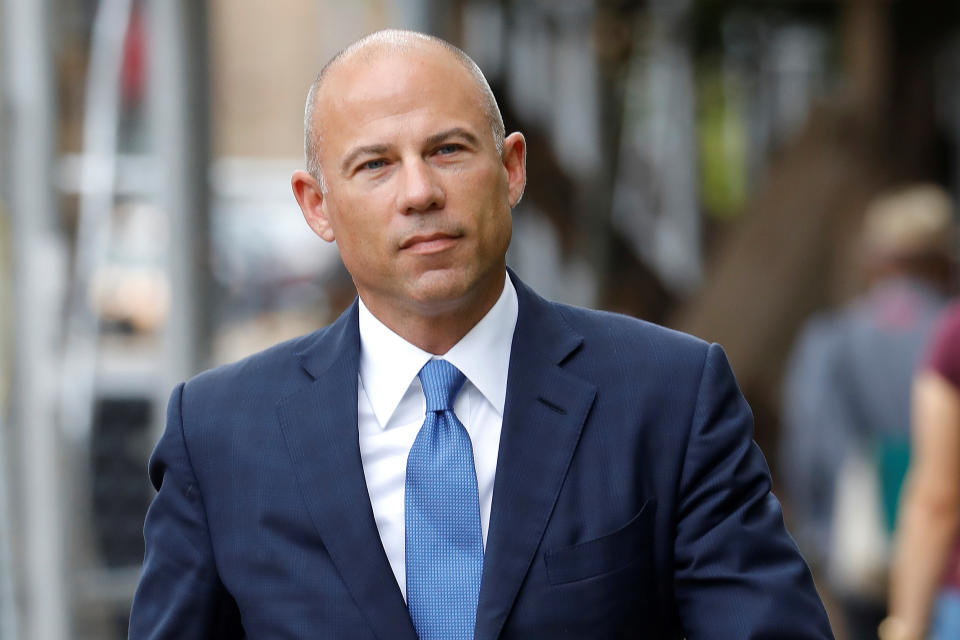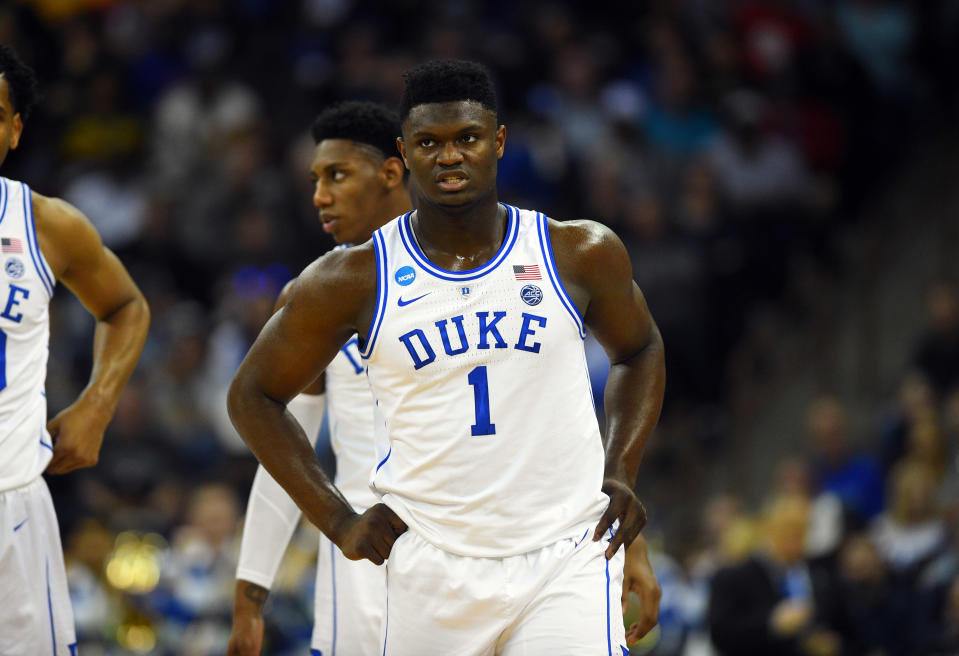Avenatti motion alleges Nike was willing to pay Zion Williamson, other college stars

A motion filed in federal court Wednesday on behalf of lawyer Michael Avenatti alleges corruption and the use of under-the-table payouts to elite high school players within Nike’s Elite Youth Basketball (EYBL) division.
In a filing that hints at the allegedly pervasive nature of payments to top prospects to play in Nike’s grassroots system, the document alleges an apparent willingness to pay $35,000 to Zion Williamson and $20,000 to Romeo Langford while they were still in high school. There is no indication either player received the money or was even presented the deals.
Avenatti was charged earlier this year by federal prosecutors in New York with extortion. The feds characterized he tried to “shake down” Nike by revealing allegations of corruption.
Avenatti has pleaded not guilty and promised to vigorously defend himself and expose Nike. The motion to dismiss is a step toward that goal.
Among the assertions:
• “Nike possessed text messages, emails, and other documents from 2016-17 … proving that Nike executives had arranged for and concealed payments often in cash to amateur basketball players and their families and ‘handlers.’”
• Nike EYBL manager Jamal James texted EYBL director Carlton DeBose and Nike recruiting coordinator John Stovall “in February 2017, asking whether they would be ‘willing to do … whatever may be needed for the Zion/Romeo situations as well as the money we’re now going to do for the [redacted due to the player being a minor] kid in Michigan?’”
Stovall, according to the motion, responded:
Langford — 20
Zion — 35 plus
[Minor] — 15
DeBose responded “that he was willing to pay Langford, Zion and [minor] the $70,000 and that they should ‘stay aggressive’ while he got ‘creative’ with the budget,” the motion reads.
Later, “Stovall informed James and DeBose that they still ‘had not presented our new offer’ to Williamson but agreed that it was not a good idea ‘to put it in print.’”
Williamson, who hails from South Carolina, played grassroots ball for teams sponsored by multiple shoe companies and then attended Nike flagship school Duke. He was the No. 1 pick in the 2019 NBA draft and signed an endorsement deal with Nike. Langford, who hails from Indiana, wound up playing under the Adidas umbrella after that company agreed in winter 2017 to sponsor an AAU program run by his father. He attended Adidas-sponsored Indiana and was the 14th pick in the 2019 NBA draft.
• “DeBose told Nico Harrison, Nike’s vice president of North American Basketball Operations, that he [DeBose] was ‘willing to bet that 38 of 40 teams in the EYBL had to pay a moderate to considerable ransom to families just to play in the EYBL. Of those 38 teams these arrangements are being viewed as a contract by the families and players.”
• DeBose, according to the motion, also “acknowledged in an exchange of text messages with an assistant coach at the University of Kentucky that Nike was funneling payments to high school players through at least ten different EYBL coaches.”
• The motion states: “An EYBL coach expressed concern to Nike executives about the fact that players and family members were getting paid and that he couldn’t ‘see how this ends well for Nike or the EYBL. Some of us will be deemed guilty by association, others will be found guilty of failure to supervise.’ ”
• “Rachel Baker, a Nike executive who led ‘Event Strategy’ for the EYBL, expressed concern to a colleague about carrying large amounts of cash through airport security and indicated that she would lie and ‘just say I just sold my car’ if she got stopped,” according to the motion.

In many cases, specifics were not included in the motion. It does suggest Avenatti has additional information and documentation detailing Nike’s conduct.
There is nothing new to the concept that shoe companies are paying top high school athletes to play in their grassroots system. The motion merely continues to show that young basketball players have extensive free-market value even before they arrive on a college campus. This persists despite the NCAA enforcing amateurism rules that prohibit players or their families from profiting off their talents.
The motion also suggests nearly every elite high school basketball player is already being paid, or could be paid if they choose, to play summer basketball. (In select cases, NCAA rules allow a shoe company to hire a parent to operate and/or coach an AAU team it funds as long as it is a bona fide employment situation.)
Meanwhile, federal prosecutors have won convictions that include prison time, making a player NCAA ineligible via such a payment.
The allegations in the motion raise questions about why the recent federal college basketball fraud case centered almost exclusively on the conduct of Adidas grassroots basketball but not its bigger rival, Nike. Defense attorneys in that case argued Adidas wasn’t bidding against itself. This motion appears to confirm that.
Adidas executive James Gatto and Adidas consultant Merl Code were both found guilty in 2018 of defrauding colleges by steering money to high school players and thus making them ineligible under NCAA rules. The appeal of their conviction was filed this week, and it repeats their argument they were operating on behalf of universities, not in an effort to defraud them.
None of the Nike employees mentioned in the motion to dismiss have been arrested, and all continue to be employed by the company.
Avenatti rose to national prominence for representing adult actress Stormy Daniels, who alleged she had a relationship with Donald Trump. He became a fierce political critic of Trump and a regular on cable television. In addition to extortion charges in New York, he is also facing three dozen criminal charges of fraud, perjury, failure to pay taxes and embezzlement in California. He’s facing what could be decades, if not life, behind bars.
In this case, Avenatti says he was negotiating on behalf of his whistle-blower client, a fired EYBL coach, who knew of payments Nike made to elite players and their families that mirrored acts by Adidas executives that resulted in two recent federal trials and multiple guilty verdicts.
Earlier this year, Avenatti alleged DeBose “bribed over 100 high school players.” In documents released last spring, DeBose is alleged to give step-by-step instructions to former EYBL coach Gary Franklin on how to manipulate the Nike invoices to help arrange money for players. Among the alleged athletes involved are current NBA players Deandre Ayton and Bol Bol, among others.
Nike responded at the time by stating it “firmly believes in ethical and fair play” and “wouldn’t respond to the allegations of an individual facing federal charges of fraud and extortion.”
Avenatti is hinging part of his dismissal argument on that he was not extorting Nike but offering to run a comprehensive internal investigation into the EYBL so the company could understand the levels of corruption.
The scheme painted in documents released both Wednesday and last spring appear to mirror the behavior that got Adidas officials in trouble. The resulting three cases over the past two years concluded with multiple felony convictions and plea deals. Among the implicated were four college basketball assistant coaches, including former Arizona assistant Emanuel “Book” Richardson, who is serving three months in prison.
While public opinion has swung considerably on compensation for young basketball stars, the prosecutors and the FBI and have made it clear that actions that cause a player who goes to college to lose their NCAA eligibility is a federal crime.
The NCAA also remains staunchly opposed to allowing players to accept any compensation off their athletic talents, including profiting off their name, image and likeness.
The allegations come at a sensitive time for college basketball. The NCAA is reeling in the wake of the basketball scandal and yet has merely proposed rule changes that have been widely panned as ineffective and out of touch with reality.
The federal investigation revealed the commonality and sophistication of breaking and averting NCAA rules, including by some of the schools’ most valued business partners, Nike and Adidas, which have hundreds of millions of dollars in contracts with NCAA schools.
More from Yahoo Sports:

 Yahoo Lifestyle
Yahoo Lifestyle 